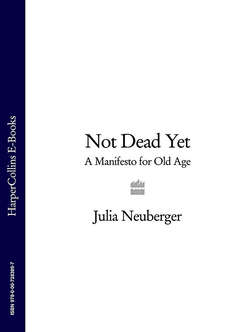Читать книгу Not Dead Yet: A Manifesto for Old Age - Julia Neuberger - Страница 23
The tyranny of a definition
ОглавлениеDr Muriel Gillick, a Professor of Ambulatory Care at Harvard Medical School, wrote one of the best reflections I have ever read on the subject of centenarians:18
Centenarians have something important to teach. Often they have wisdom arising from their accumulated experiences which they enjoy sharing, and which they are able to share because they aren’t burdened by multiple maladies, each with its own demanding regimen of pills, monitoring tests, and physician visits. Their world is the antithesis of the elderly community in Florida, which has developed a culture that revolves around their health. The average elderly Floridian sees multiple specialists, often making more than one physician visit each week. Gathered around the table while eating an ‘early bird special,’ they exchange doctor stories. When one member of the group reports that he has seen a new specialist – perhaps a rheumatologist has joined the ranks of his cardiologist, urologist, and general internist – the others eagerly add the new doctor to their own list of ‘providers.’ In parts of Florida, the state with the largest elderly contingent in the United States, Medicare spends more than twice as much per capita for health care as it does anywhere else. What its citizens get in exchange for this largesse is more hospital days, more tests, more ICU admissions, and more subspecialty consultations in the last six months of life, with no evidence that the additional attention improves the quality of care.
But Professor Gillick says there is another lesson which is even more relevant to the question of definition:
The usual claim is that centenarians remain robust until a catastrophic event occurs, at which time, like the ‘one-hoss shay’ of Oliver Wendell Holmes, they collapse completely. Centenarians are different from other people in that the ageing process has been postponed – at age 95, their organs are like those of a typical 75-year-old. But there is no reason to believe that their organs are programmed to fail simultaneously. The reason the centenarian dies from his pneumonia or his heart attack is that doctors do not aggressively treat their 100-plus-year-old patients – they do not routinely admit them to the intensive care unit, place them on a breathing machine, start dialysis, or initiate any of the other interventions that are commonplace in octogenarians. Centenarians die quickly because we let them, and the 85-year-olds die slowly because we don’t.
There are other ways in which our mechanistic definitions of old age undermine the health of older people. Far too many drugs are given to older people, quite inappropriately, wrote Dr Mark Copperfield, in his column in The Times, arguing that sensible older people refuse to take most of them, restricting themselves to ‘the pink ones that stop their joints from aching’.19
But, he says, the trouble starts when they go into a care home, and matron insists on giving them the lot, promptly at 7 p. m., ‘with predictable consequences’. Meanwhile, others who have been there longer are falling like ninepins, going to the hospital, having too many of all sorts of analgesics, sedating drugs, antidepressants and whatever.
Sir Richard Doll, who discovered the link between smoking and lung cancer, died at 92 and worked long past retirement, told pensioners not to expect NHS time and money to be spent on research into prolonging life, and advised them to ‘live dangerously’. The alternative is that you will be defined according to a mechanistic definition of your age and treated accordingly.
